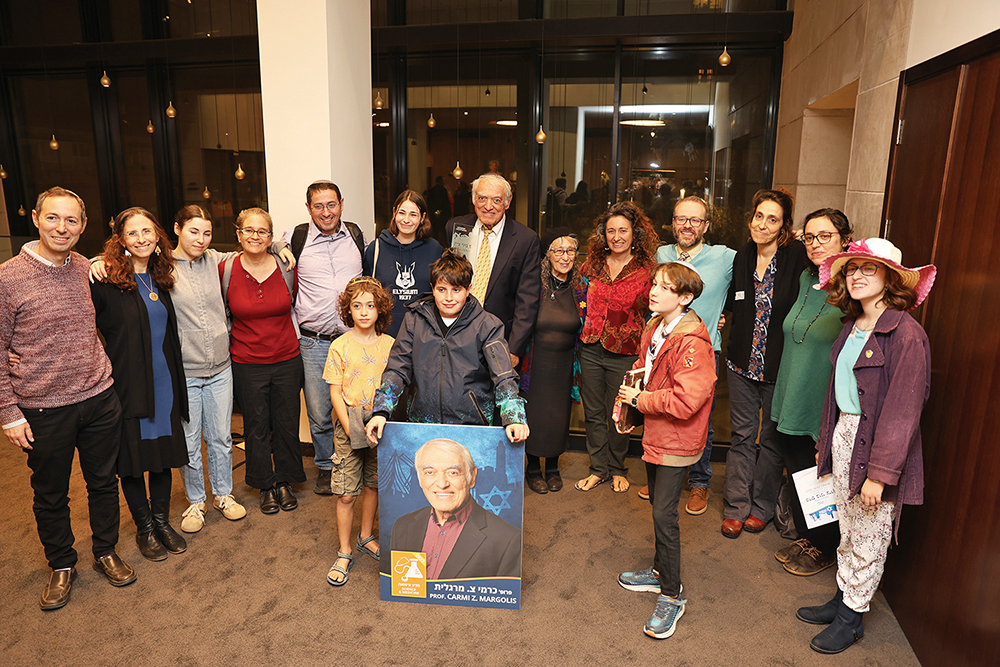
Bronx-born Professor Carmi Margolis has spent nearly five decades developing medicine in Israel’s desert. His Israeli medical journey began in 1968 during his medical studies at New York University when he received an opportunity to visit Israel as part of a program to practice medicine in “developing countries.”
That is when Margolis met Professor Moshe Prywes, a forward-looking medical educator, who a few years later would become the first president of Ben-Gurion University and would go on to establish its unique Faculty of Health Sciences dedicated to medical education, a discipline designed to research and innovate all aspects of teaching and learning medicine. After a three-month stay in Israel, Margolis returned to the United States to complete medical school at NYU and a pediatric residency at Yale University, followed by a fellowship in medical education at Michigan State University. He was then drafted into the United States military as a pediatrician, but returning to Israel was always on his mind.
In 1974 he received a special invitation from Prywes, who had a vision to build a medical school that would rest on the Negev sands and be oriented not only toward research but on practicing medicine in the community. Margolis was asked to help create a workshop on the basics of medical education and curriculum development to physicians in Beersheva who would be the future teachers at this school. Margolis returned to the United States to complete his military service and found himself back in Israel in 1975 with his wife, Adinah, this time as a new immigrant in Beersheva with a mission.
During his first years in Israel, Margolis focused on helping to build the university’s health science faculty with the highest standards of professional training and a humanistic approach to each patient. Some of the unique programs he helped to introduce were early clinical training that focused on the holistic patient care from the first weeks of a student’s studies, communications skills in medicine and clinical problem solving and decision making, along with other innovations in medical education.
The state-of-the-art medical school has been crucial to the development and continuous improvement of health services in the Negev and beyond and has trained thousands of physicians and researchers who have introduced clinical and basic science innovations to the understanding of disease and practice of medicine. Margolis acknowledged that the opportunity to participate in the founding of a medical school was a once in a generation opportunity that he was privileged to experience.
Margolis also established the medical school’s department of community health in 1978 to focus on family medicine, serving as its founding chair for 13 years, as well as directing the Prywes Center for Medical Education at Ben-Gurion. During these years, Margolis was developing an increasing interest in global health and medicine. In 1998, he co-founded with Professor Richard Deckelbaum the Ben-Gurion University Medical School for International Health in collaboration with Columbia College of Physicians and Surgeons. The North American-style medical school afforded international students the opportunity to study global health in English in the Negev, where they would have exposure to diverse populations of patients including Arabs and Bedouins, immigrants from Ethiopia, the former Soviet Union, and Middle Eastern countries.
Margolis assumed the role of founding dean of the school until he stepped down in 2009. Along with his academic career, Margolis continued to teach and practice pediatrics at Soroka University Hospital and to provide pediatric consultation to clinics in southern Israeli communities.
Working in the Negev provided Margolis with unique “only in Israel” encounters that brought tremendous meaning to his years of service. One example is the Bedouin Mobile Care Unit established by his team in the community health department during the department’s early years to provide follow-up care to Bedouin families with limited transportation. Margolis estimated that 60% of hospitalized children in the mid-1970s were Arab.
“I gradually had to learn what I could about Bedouin culture. Being in the Negev made this kind of connection possible in a different way from what it might have been if I was in Tel Aviv or Jerusalem,” said Margolis. He emphasized that the best cultural education he ever received was by living in the Negev alongside Arab-Israeli and Bedouin neighbors.
In December Margolis was awarded the 2023 Sylvan Adams Nefesh B’Nefesh Bonei Zion Prize for his lifetime achievements in the field of science and medicine. Though formally retired from academia, Margolis, a father of five and grandfather of 14, continues to provide pediatric consultation at the Leumit Health Service clinic in Arad in the Negev. He also spends much time writing fiction, another passion that he has maintained throughout his medical career.
Margolis’ magnificent contributions to medicine in Israel’s southern periphery are rooted in his commitment to taking care of people — no matter where they come from. “Real connections are not only about those familiar to us but those from different cultures and different places. And medicine is a powerful way to build those bridges,” he concluded.
Alisa Bodner is a Fair Lawn native who immigrated to Israel over a decade ago. She is a nonprofit management professional who enjoys writing in her free time.









